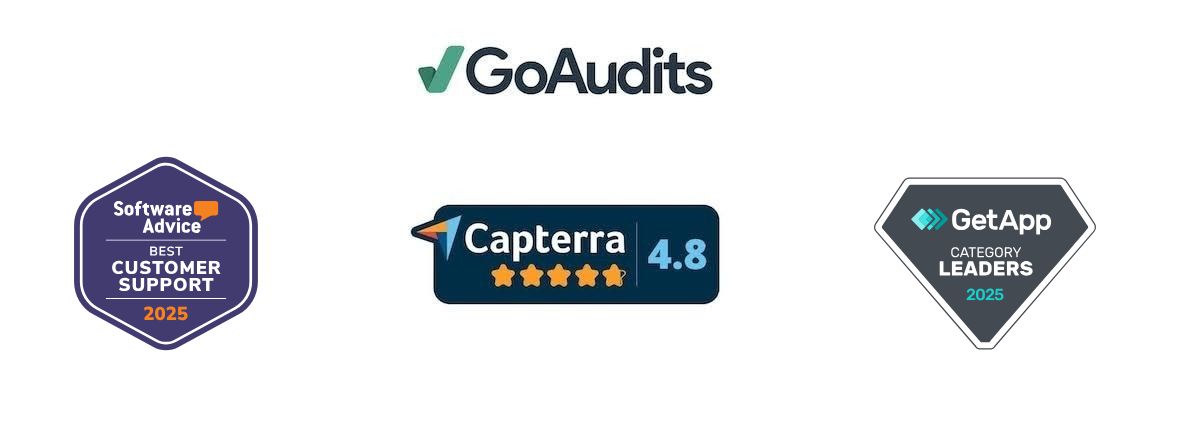Running a restaurant today requires more than great food and service. You need efficient systems to handle reservations, inventory, staff scheduling, and customer engagement, and ensure compliance with food safety standards. Manual processes often lead to errors, wasted resources, and lost revenue. Restaurant management software can streamline daily operations, centralize data, cut costs, and improve customer experience. You can make smarter decisions and free up time to focus on growth. However, to enjoy these benefits, you need to select the right restaurant management software, which can be difficult considering the number of options available in the market.
This article lists the best restaurant management software and tips to help you choose the right one.
Top 10 Restaurant Management Software in 2026
To simplify comparisons, restaurant operations can be divided into six core categories. Most software solutions address some, but not all, of these areas:
- Operational Quality & Compliance: Food safety, service quality, SOPs, brand standards, staff training
- POS & Billing: Order processing, payments, receipts
- Orders & Reservations: Table bookings, waitlists, delivery, and takeout orders
- Inventory & Kitchen: Recipe costing, supplier management, kitchen display systems (KDS)
- Staff & HR: Scheduling, payroll, attendance tracking
- CRM & Guest Experience: Loyalty programs, promotions, customer databases, guest feedback
The comparison table below highlights how the best restaurant management software fits into these categories. You can quickly identify which platforms cover the functionalities most relevant to your restaurant.
| Software | Functionalities | Pricing | Free trial & demo |
| GoAudits | – Mobile food safety & hygiene audits (offline) – Compliance monitoring & SOP checklists – Customizable templates for daily operations – Issue tracking & corrective actions across sites | $10 per user per month; billed annually | 14-day free trial and personalized demo |
| UpMenu | Online ordering, POS & order management, restaurant website and mobile apps, delivery management & dispatch, marketing and loyalty tools | Starts at $49 per location per month | 7-day free trial and demo available |
| TouchBistro | Order processing, payments, tableside ordering, inventory management, kitchen display system (KDS), staff management, loyalty programs | Starts at $ 69 per month | Demo available |
| Eat App | Reservations, table management, guest profiles, automated marketing, and feedback collection | $34 per month; billed annually | Free trial and demo available |
| Rezku | POS & billing, delivery & takeout orders, inventory & kitchen management, staff & HR, loyalty programs & promotions | Starts at $49 per month | Demo available |
| Deliko F&B | Quality & compliance, POS & billing, orders & reservations management, inventory & kitchen management, staff & HR, CRM & guest experience | – | Live demo |
| Restaurant365 | Accounting, inventory, workforce management, and payroll, with integrations to complement POS, reservations, and CRM functionalities | Request quote | Demo available |
| MarginEdge | Invoice processing, inventory management, recipe costing, POS & accounting integrations, vendor bill payments | $330 per location per month | Demo available |
| Restroworks | POS & billing, inventory management, data analytics & reporting, staff & server management, menu management, CRM | Request an estimated price | Demo available |
| Toast | POS & billing, orders & reservations management, inventory & kitchen management, staff & HR, CRM & guest experience, quality & compliance | $69 per month | Demo available |
1. GoAudits: Restaurant Operations Management Software
If your priority is operational quality, audits, and multi-site compliance, GoAudits stands out. It offers mobile inspections (offline), HACCP/SOP checklists, instant branded reports, corrective actions with ownership & deadlines, and dashboards to compare locations over time. Upload your existing checklists and our team will digitize them for you at no extra cost, so you can roll out standardized procedures in days, not months.
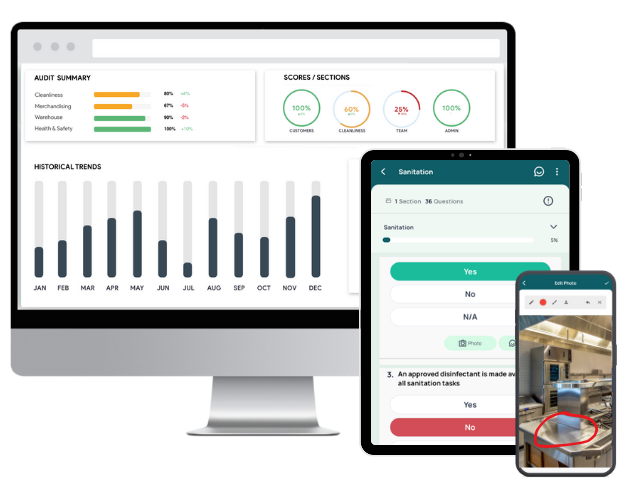
Key features of GoAudits:
- Customizable restaurant checklists: Digitize your opening/closing, cleaning, and food safety checklists or start from ready-to-use templates.
- Mobile inspections (even offline): Capture photos, notes, e-signatures, and assign corrective actions on the spot.
- Instant branded reports: Automatically share results with managers for fast follow-up.
- Corrective & Preventive Actions (CAPA): Assign tasks with deadlines and track completion to ensure accountability.
- Dashboards & trends: Monitor performance across locations, spot recurring issues, and stay audit-ready.
- GoAudits restaurant management app offers a 14-day free trial, or you can book a tailored demo.
👉 Best for: Restaurants of all sizes, or multi-site restaurants and franchises that need consistent standards, audit readiness, and a strong food safety culture.
2. UpMenu
UpMenu is an all-in-one restaurant management software that combines online ordering, point-of-sale (POS), delivery operations, and customer engagement in a single system. It helps restaurants manage direct online sales, coordinate deliveries, and run daily operations from a single platform. It supports revenue growth by combining operational and marketing tools, enabling restaurants to gain greater control over their brand and margins.
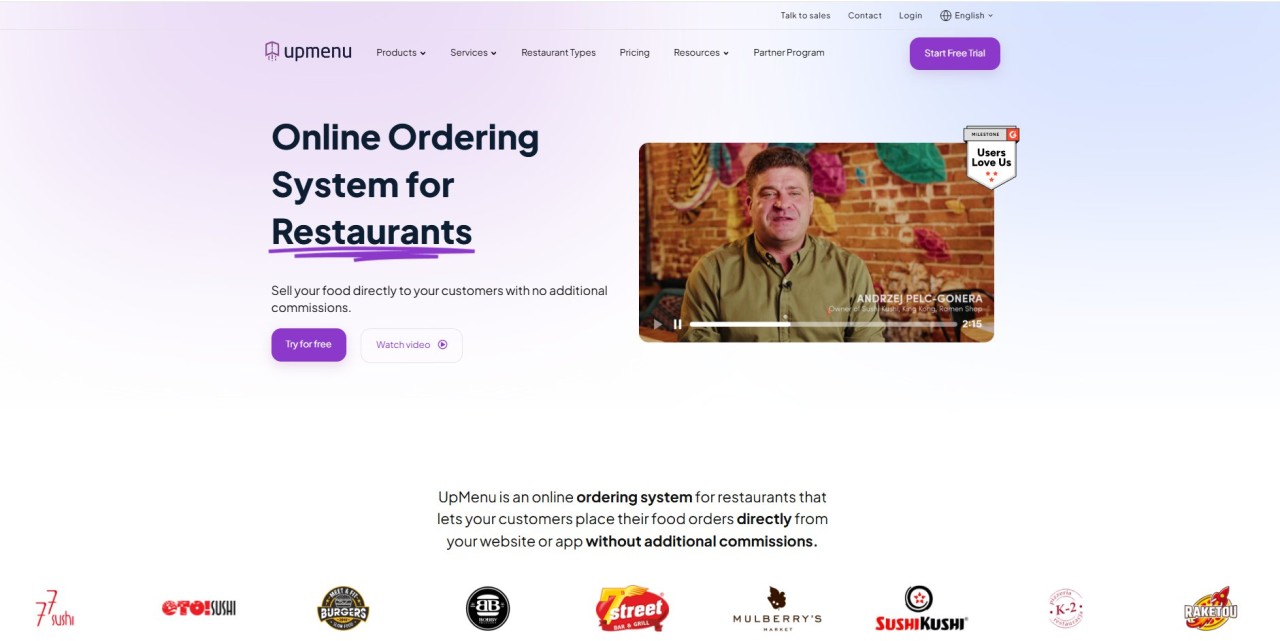
Key features of UpMenu:
- Accept commission-free orders through a branded restaurant website and mobile apps.
- Manage dine-in, takeaway, and delivery orders in a single system with built-in POS and centralized order management.
- Coordinate restaurant deliveries with a flexible dispatch tool, real-time tracking, and driver management.
- Enable delivery fulfillment even without an in-house driver team by using on-demand courier options.
- Increase repeat orders with built-in marketing tools, promotions, and customizable loyalty programs.
3. TouchBistro
TouchBistro is a restaurant management system designed to improve order accuracy, increase sales, and reduce costs. From front-of-house service to back-of-house efficiency and guest engagement, it integrates all essential tools into a single solution. TouchBistro provides a seamless dining experience across dine-in, takeout, and delivery channels. You can manage staff, inventory, and guest relationships, ensuring both operational efficiency and customer satisfaction.
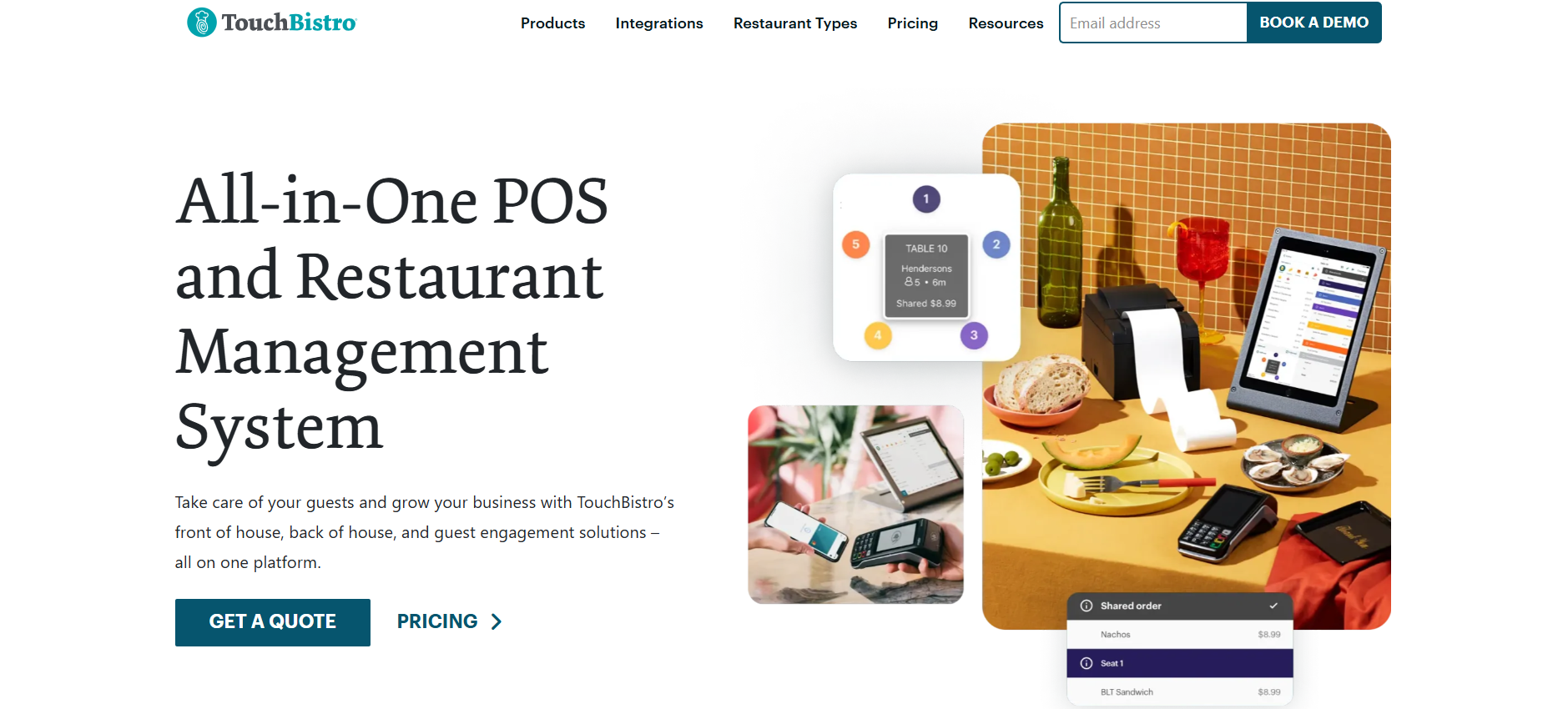
Key features of TouchBistro:
- Manage orders, payments, menus, and tables from one centralized, cloud-based restaurant management software.
- Optimize inventory, labor, and kitchen performance while minimizing waste and costs.
- Drive loyalty with gift cards, marketing, online ordering, and reservation management.
- Access real-time data on sales, staff performance, and profitability.
- Speed up service with tableside ordering, customer-facing displays, and efficient floor plan management.
4. Eat App
Eat App is a restaurant management software designed to streamline reservations, optimize table management, and enhance guest experiences. By unifying operations, CRM, marketing, and reporting in one system, it helps restaurants boost revenue, reduce inefficiencies, and build stronger customer relationships.
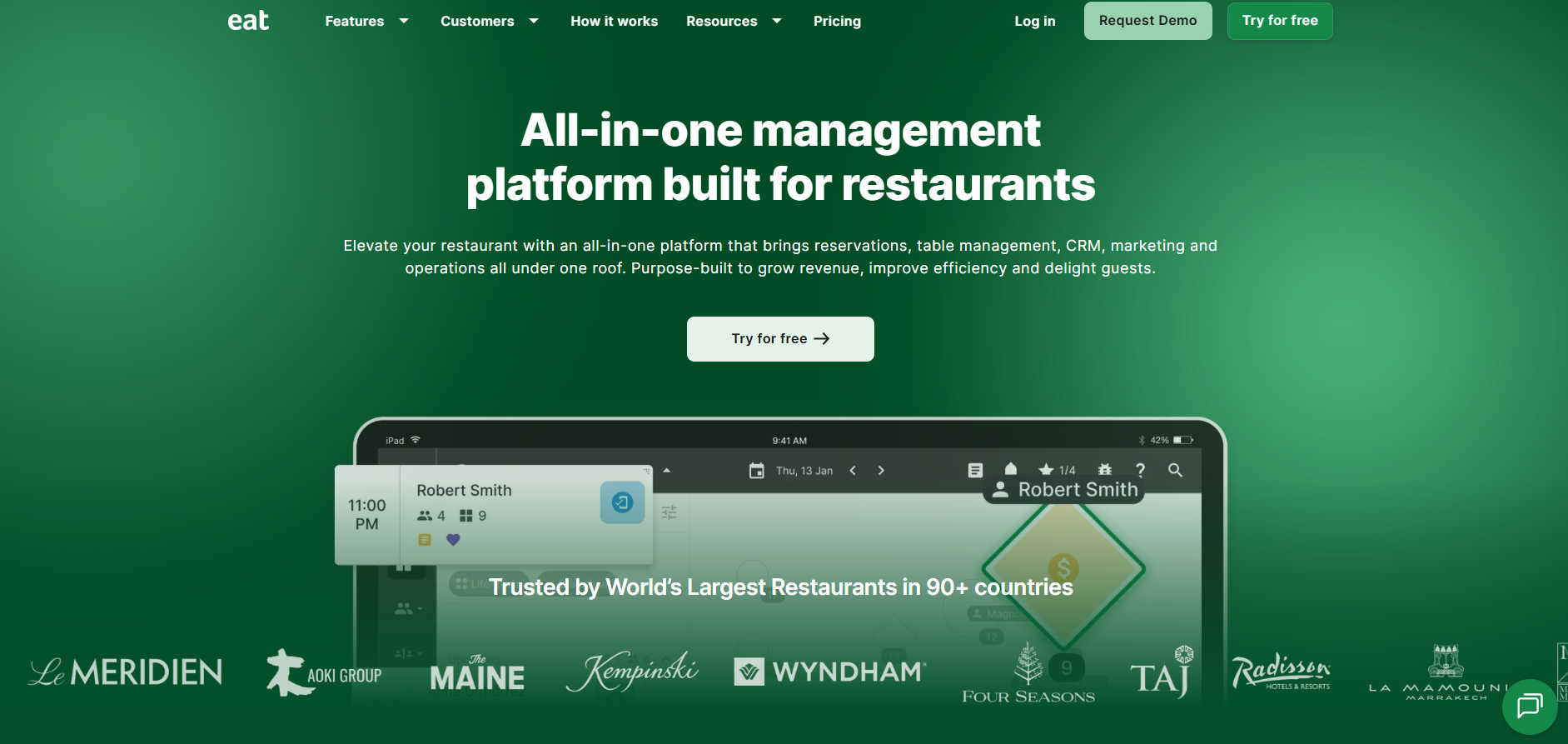
Key features of Eat App:
- Accept reservations 24/7 from your website, Google, and social channels with no commission fees.
- Optimize seating, automate waitlists, and reduce empty tables with AI-powered allocation tools.
- Personalize marketing and service with dining history, preferences, and spend data.
- Increase repeat visits and event bookings with targeted email, SMS, and WhatsApp campaigns.
- Manage customer data, reservations, and performance reports across all locations.
5. Rezku
Rezku combines a point-of-sale (POS) system with flexible tools that adapt to any restaurant type, from bars and pizzerias to fine dining establishments. With 24/7 customer support, unlimited training, and continuous platform updates, you can manage inventory, staff, orders, and customer engagement efficiently. It helps you reduce errors, optimize costs, and grow your business.
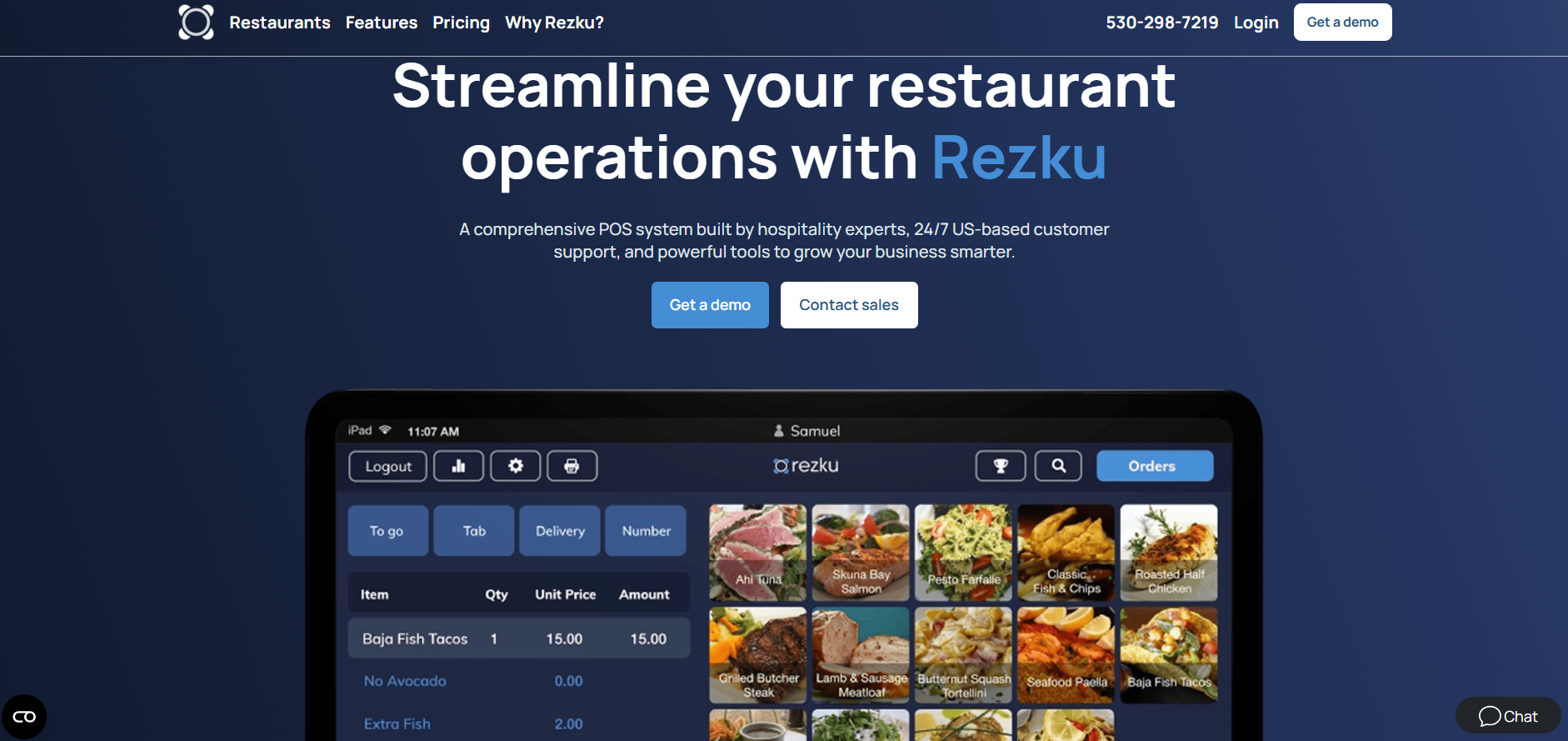
Key features of Rezku:
- Create a custom-branded digital storefront to increase repeat orders and boost upsells.
- Monitor ingredient usage to reduce waste, prevent theft, and control food costs.
- Access over 100 customizable reports to make informed, data-driven decisions.
- Streamline staff scheduling, manage roles, and process orders or payments directly at the table.
- Enhance loyalty and retention with built-in rewards, digital gift cards, QR code ordering, and self-service kiosks.
6. Deliko F&B Solution
Deliko is built to ensure your restaurant runs smoothly and profitably. From single outlets to multi-location chains, it brings POS, operations, and management under one roof. It adapts to your unique workflows, integrates seamlessly with third-party tools, and supports everything from quick-service counters to fine dining establishments.
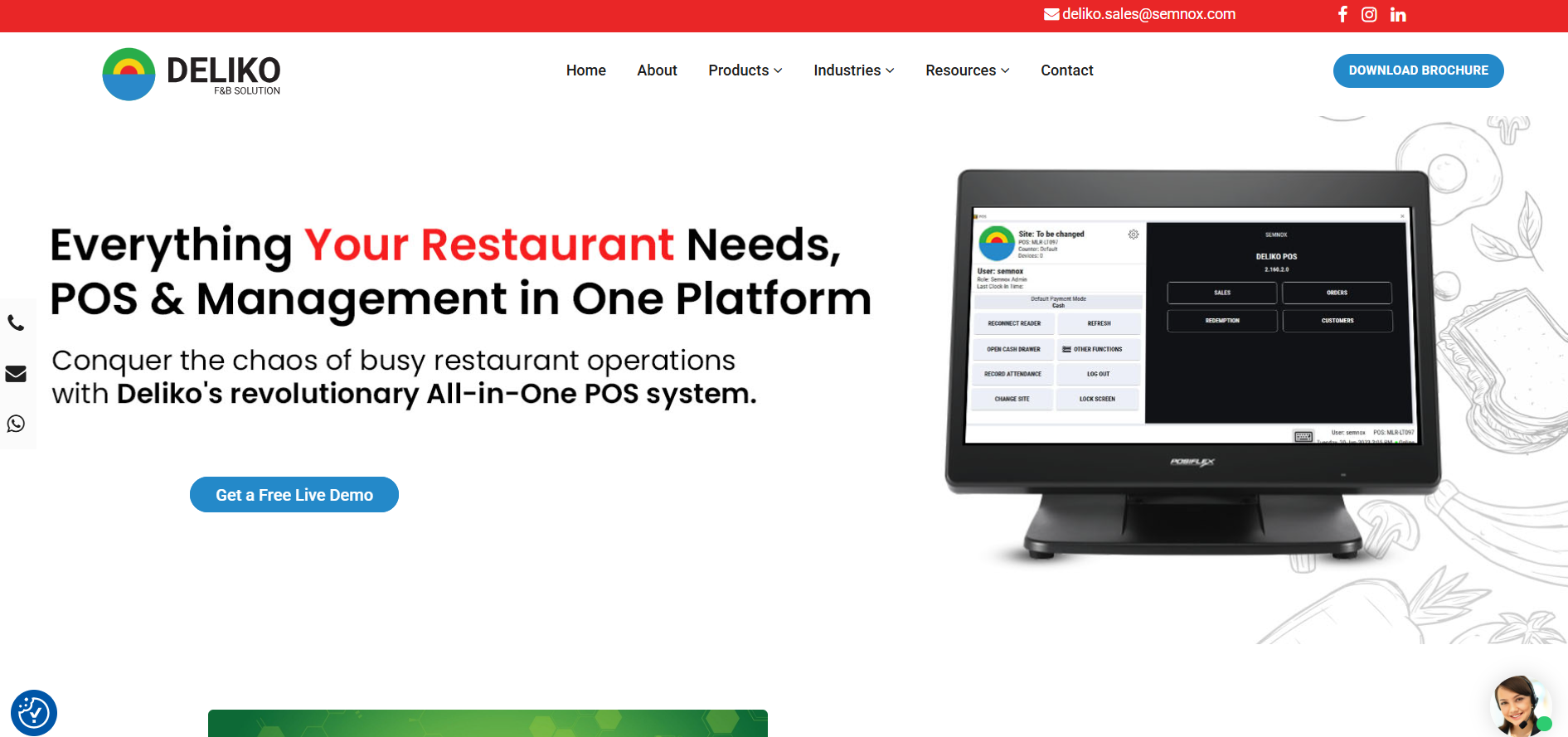
Key features of Deliko:
- Manage orders, billing, inventory, staff, and reports in one centralized system.
- Tailored solutions for single outlets, multi-chain operations, or head office control.
- Connect with payment gateways, accounting tools, and delivery platforms.
- Round-the-clock assistance ensures uninterrupted operations and customer satisfaction.
- Affordable pricing with continuous optimization to lower operational costs.
7. Restaurant365
Restaurant365 is a back-office restaurant management platform that integrates accounting, inventory, scheduling, workforce management, and payroll into a single system. It gives you accurate, real-time insights into costs, performance, and labor, helping you reduce expenses and increase efficiency.
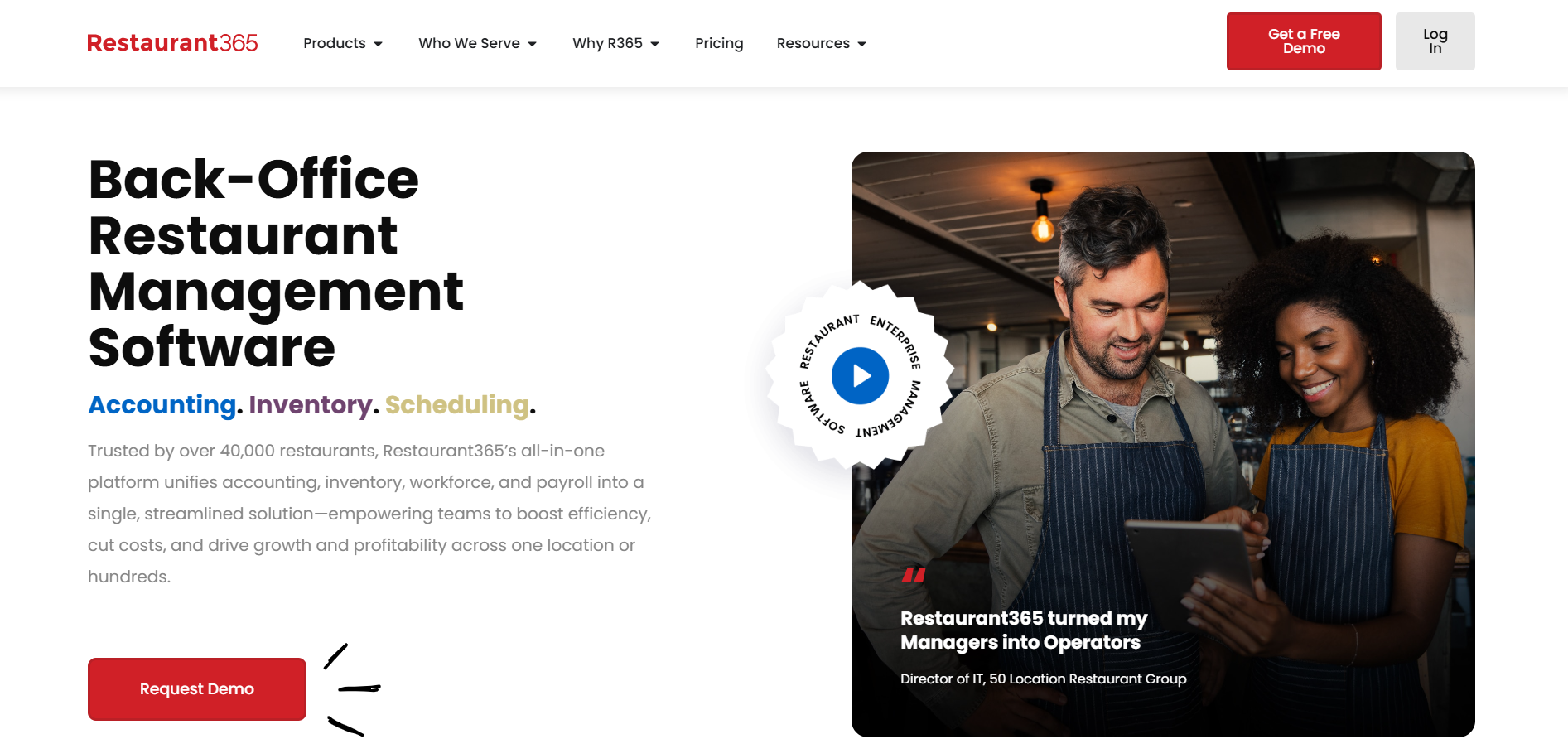
Key features of Restaurant365:
- Automatically generate accurate sales and labor journal entries from POS data.
- Track food, beverage, and labor costs in real time with tools to monitor prime cost and improve profit margins.
- Optimize labor spend while ensuring adequate staffing levels with sales forecasting and AI-driven scheduling.
- Manage payroll, benefits, hiring, and onboarding seamlessly to save time and reduce errors.
- Connect POS, banks, and vendor systems to centralize data flow and gain a complete view of restaurant performance.
8. MarginEdge
MarginEdge is a restaurant management software designed to simplify back-office operations and provide operators with real-time financial insights. It eliminates the need for manual data entry, streamlines invoice processing, and delivers daily profit and loss reports. It offers visibility into food costs, menu performance, and operational efficiency.
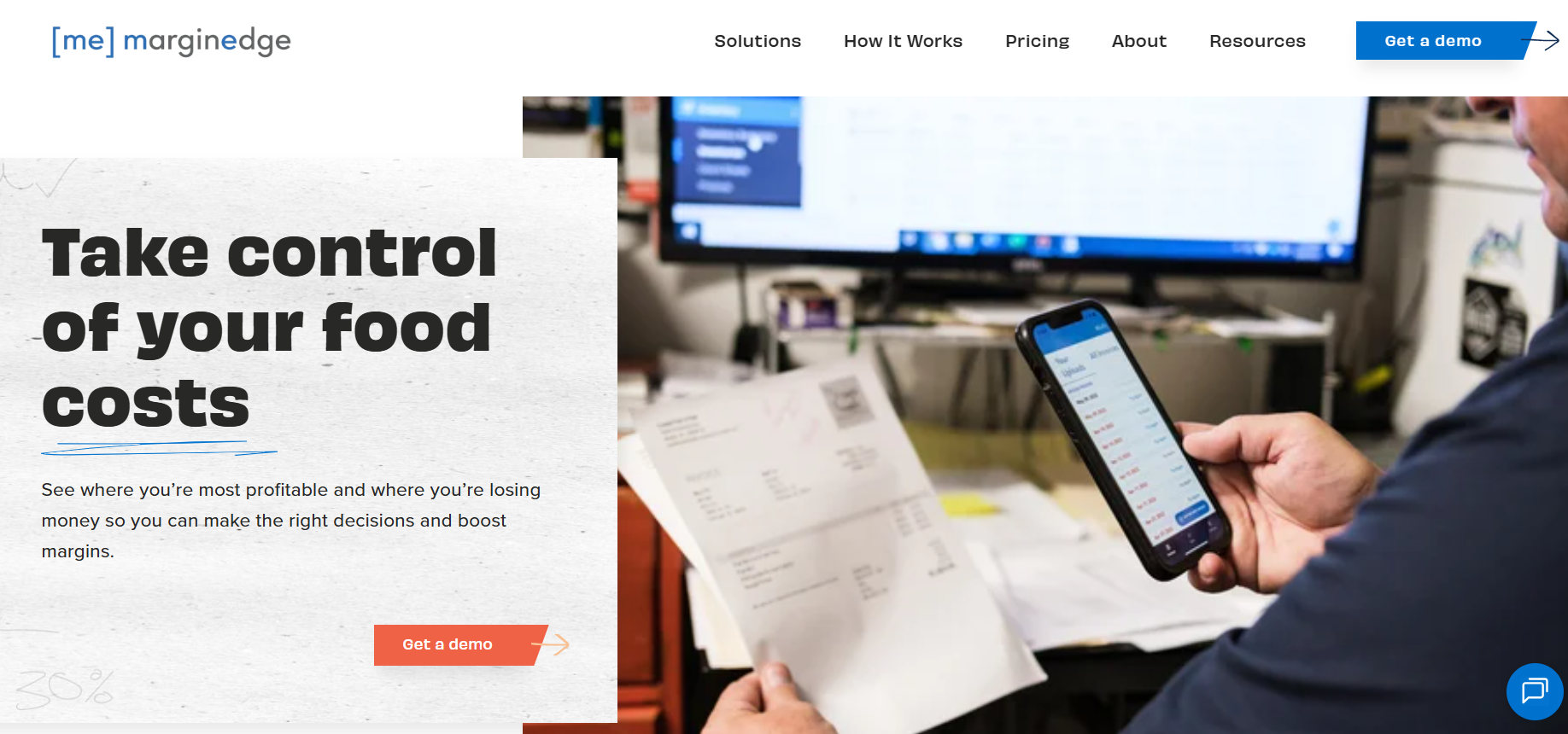
Key features of MarginEdge:
- Access up-to-date profit and loss statements updated automatically as invoices are processed.
- Eliminate manual data entry with a system that digitizes and categorizes invoices.
- Monitor ingredient price changes, usage, and waste to stay ahead of food costs.
- Compare purchases, sales, and on-hand counts to simplify inventory control and uncover insights.
- Analyze the profitability and popularity of menu items using real-time ingredient costs and sales data.
9. Restroworks
Restroworks brings every essential function, such as front-of-house, back-of-house, supply chain, and guest experience, together under one system. It streamlines operations and provides real-time insights, enabling you to focus on serving guests and driving sustainable growth. It gives you full control, visibility, and flexibility across your restaurant ecosystem. From menu updates to advanced analytics, you can make faster decisions while keeping operations secure.
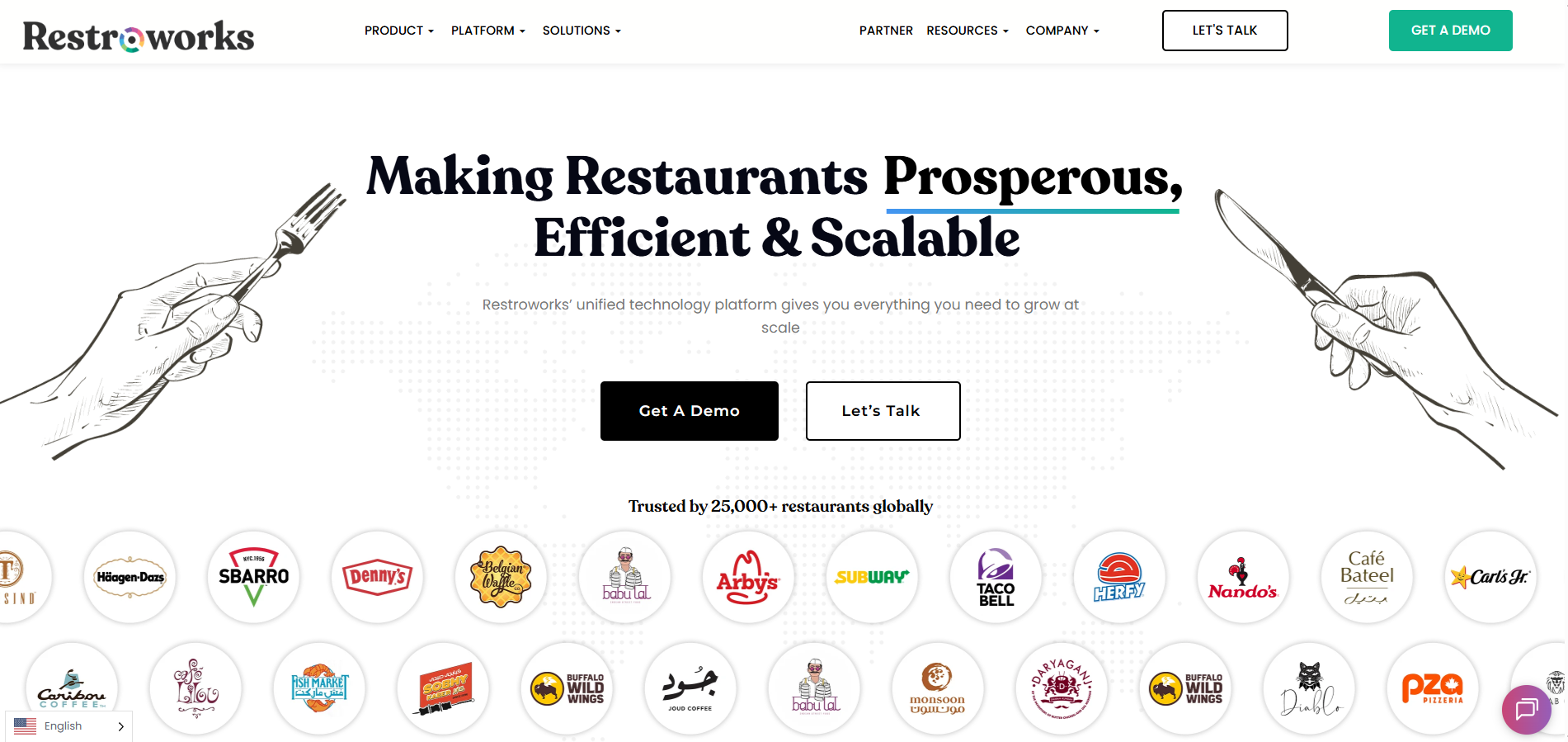
Key features of Restroworks:
- Manage dine-in, delivery, and digital orders with POS, kiosks, QR ordering, etc.
- Control inventory, monitor supply chains, and simplify kitchen workflows.
- Access real-time reports, enterprise-level forecasting, and anti-theft analytics.
- Leverage BFCD architecture and API/ERP integrations to scale operations.
- Protect customer data with global standards and manage menus across outlets with real-time synchronization.
10. Toast
Toast gives you complete visibility into your restaurant’s performance so you can make smarter, faster decisions. From real-time sales insights to detailed cost tracking, Toast helps you uncover trends, improve operations, and grow profitably. It combines reporting with easy-to-use tools, making it simple to stay in control.
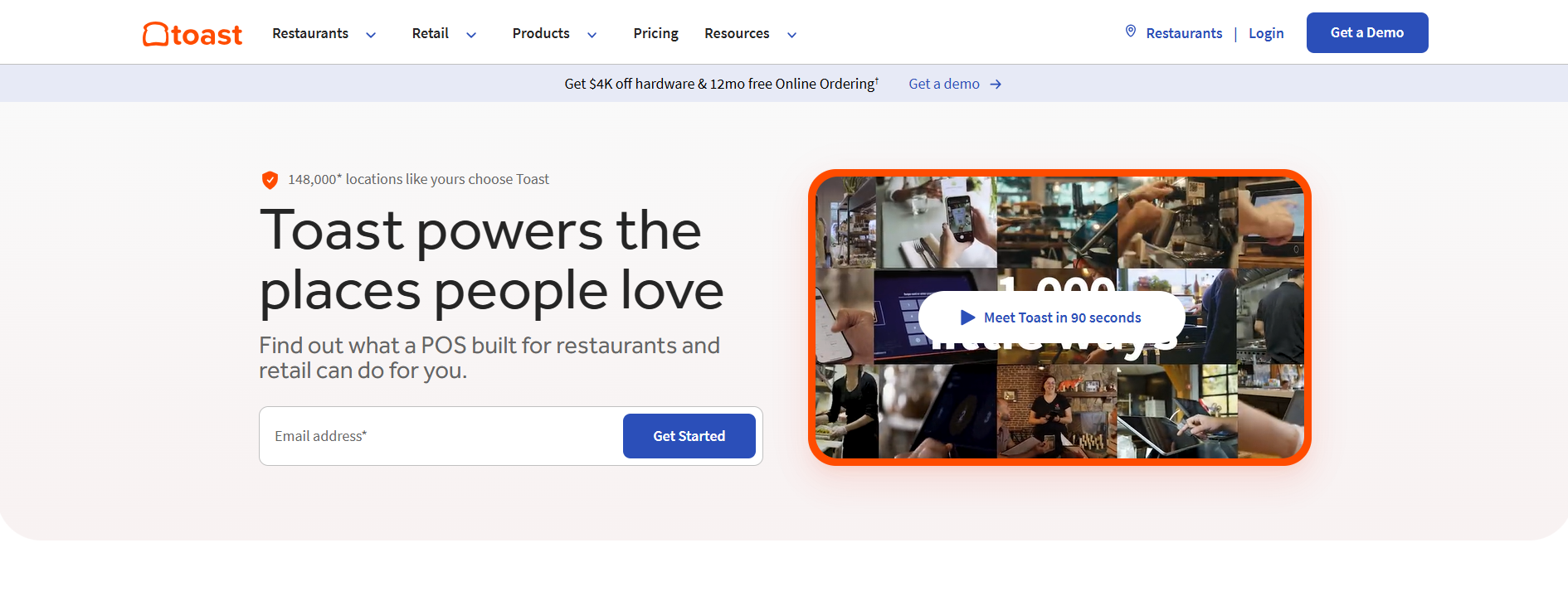
Key features of Toast:
- Monitor sales as they happen, broken down by item, category, or location.
- Identify top-selling items and underperformers to optimize your menu and boost margins.
- Track labor costs against sales, forecast staffing needs, and streamline payroll.
- Gain precise visibility into food costs and waste, helping you control expenses.
- Build detailed reports tailored to your business, from daily summaries to long-term performance trends.
Free Restaurant Audit & Other Food Safety Checklists
GoAudits offers ready-to-use restaurant audit checklists. You can sign up for free and start using these checklists, or you can even digitize your restaurant SOPs into actionable checklists.
- Restaurant Opening Checklists & Templates
- Restaurant Closing Checklist & Templates
- Restaurant Cleaning Checklist & Templates
- Food Safety Checklists & Audit Templates
- HACCP-Based SOP Templates
- GMP Audit Checklist Templates
- BRC Audit Checklists
- FSSC 22000 Audit Checklists
What is Restaurant Management Software?
Restaurant management software is a suite of digital tools designed to streamline and automate a restaurant’s core operations, such as order processing, inventory management, staff scheduling, accounting, analytics, reservations, and online ordering.
Restaurant management software is essential for modern restaurants aiming for improved productivity, greater accuracy, and a smoother guest experience.
Why Restaurants Need Restaurant Management Software
If you rely on manual methods or disconnected systems to manage reservations, track inventory, monitor staff performance, maintain accurate financial records, etc., it can lead to errors, wasted time, and dissatisfied customers. Restaurant management software centralizes these operations, giving you real-time visibility into every aspect of your business. With automated tracking and reporting, you can make informed decisions quickly and avoid costly mistakes.
It also improves efficiency and customer experience. Features such as digital menus, online ordering, and integrated payment processing reduce wait times and streamline service. Inventory alerts prevent shortages, while employee scheduling tools minimize staffing conflicts. Restaurant management software enables you to focus on delivering consistent quality and driving business growth.
Types of Restaurant Management Software
Efficient restaurant operations depend on the right software. Each type of software addresses specific challenges, helping you save time, reduce errors, and improve customer experience.
Restaurant Order Management Software
It streamlines the process of receiving, tracking, and fulfilling orders. It connects front-of-house and kitchen staff, ensuring accuracy and reducing delays. Many systems also support online orders and third-party delivery integrations.
Restaurant Inventory Management Software
Inventory management software tracks stock levels, usage patterns, and supplier orders. It alerts you to shortages, prevents overstocking, and helps control food costs. Some solutions also provide automated reordering and waste tracking.
Restaurant Staff Management Software
It simplifies scheduling, attendance, and payroll. It ensures optimal staff allocation during peak hours and helps reduce labor costs. Features like performance tracking and communication tools also improve team coordination.
Restaurant Reservation Management Software
This software allows guests to book tables online or via phone without confusion. It prevents double-booking, optimizes seating layouts, and provides real-time availability updates. It also improves customer convenience and reduces wait times.
Restaurant Kitchen Management Software
Kitchen management software connects orders directly to kitchen displays, reducing miscommunication and paper tickets. It prioritizes dishes based on preparation time, ensuring smooth workflows. Some platforms also track preparation times and staff performance.
Restaurant Waste Management Software
This software monitors food wastage, spoilage, and unused ingredients. By identifying patterns, it helps reduce costs and promotes sustainability. This data also supports better purchasing and portion control.
Data and Analytics Software for Restaurants
Reporting and analytics software for restaurants collects and analyzes sales, customer behavior, and operational data. It provides insights into menu performance, peak business hours, and profitability. These insights support data-driven decision-making and long-term planning.
Restaurant CRM Software
Customer relationship management software stores guest information, order history, and preferences. It helps personalize service, manage loyalty programs, and send targeted promotions. Strong CRM use can increase customer retention.
Restaurant POS Software
Point of sale (POS) software manages sales transactions, payment processing, and receipts. It often integrates with other systems, such as order and inventory management. A modern POS also supports multiple payment methods, including digital wallets.
Restaurant Billing Software
It ensures fast and accurate bill generation. It reduces errors, supports split payments, and integrates with POS systems. Advanced options also offer tax calculations and digital invoice sharing for customer convenience.
How to Choose the Best Restaurant Management Software?
With many options available, choosing the best restaurant management software becomes challenging. Use the following criteria to evaluate your needs and make an informed decision.
Understand your restaurant’s requirements
Start by identifying your challenges and goals. A fine-dining restaurant may need advanced table reservation features, while a quick-service outlet may focus on inventory control and speed of billing. Define whether you want to streamline operations, improve staff productivity, enhance compliance, or gain better insights through analytics.
Look for cloud-based restaurant management software
Cloud-based software reduces upfront costs, eliminates complex installations, and offers remote accessibility. You can manage operations from anywhere and benefit from real-time updates across multiple outlets. Regular software updates and easy scalability also make cloud solutions more reliable than traditional systems.
Check restaurant management software reviews
Research user reviews on trusted platforms and study testimonials from businesses similar to yours. Pay attention to comments on performance, customer support, and usability. This helps you gauge real-world experiences and avoid common pitfalls.
Look for essential features
Prioritize software with features that align with your workflows. Key functionalities include:
- Customizable checklists for daily operations
- Mobile auditing with offline access
- Instant report generation
- Corrective and preventive action (CAPA) management
- Workflow automation
- Data analytics for performance monitoring
These features streamline tasks, reduce errors, and support data-driven decision-making.
Ensure affordability and scalability
Choose a solution that fits your budget without compromising on critical features. At the same time, ensure the software can grow with your business. Scalable solutions let you add users, outlets, or modules as needed without requiring a complete system change.
Check data security
Protecting sensitive customer and business data is non-negotiable. Look for software that follows industry-standard encryption, secure cloud storage, and compliance with data protection regulations. A secure system builds trust and minimizes risks.
Opt for user-friendly and intuitive software
Complicated interfaces slow down adoption and create frustration. Choose a platform with a clean design and easy navigation so that your staff can learn quickly and use it effectively without extensive training.
Ask for free trials and personalized demos
Before committing, request a free trial or demo. This allows you to test the software in real conditions, evaluate its performance, and confirm whether it integrates well with your processes. Personalized demos also give you a chance to clarify doubts with the provider.

